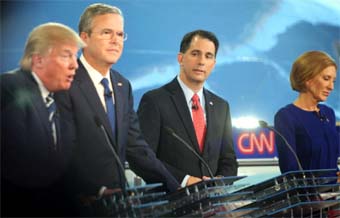
Scott Walker Suspends Campaign
| published September 21, 2015 |
By Thursday Review staff
He was once one of the Republican Party’s de facto front-runners and a rising star for the party’s conservative base. But now he has suspended his campaign for President and becomes the second major GOP candidate to fall from the race.
Wisconsin Governor Scott Walker announced this evening that he will cease campaigning for the 2016 GOP nomination and return to working full time as Governor. The Walker campaign will continue to operate some fundraising activities in order to pay down campaign debt, but otherwise his campaign will suspend further active work in the field and online.
Walker’s departure comes about a week after former Texas Governor Rick Perry suspended his campaign due to lack of funding. Perry had been a late arrival to the race, and his presence in the crowded GOP field had little effect. Perry remained buried in single digits in polling and often appeared near the bottom of surveys when polls were conducted among likely Republican voters. And like his colleagues among the second tier of debate participants—former New York Governor George Pataki, former Pennsylvania Senator Rick Santorum, South Carolina Senator Lindsey Graham, Louisiana Governor Bobby Jindal, and others—Perry was unable to get his message out to potential Republican voters via the heavily watched debates on Fox News and CNN.
But Scott Walker’s campaign was different. Walker was at one time a front-runner, only four months ago tied with former Florida Governor Jeb Bush for first place in many polls. Walker was also a popular hero of many GOP conservatives and evangelicals, and he seen by some party strategists as a potential leader for the Republican Party’s future. Walker’s early fundraising efforts were successful, pulling in some $20 million in 90 days. His well-received campaign appearances at conservative forums and political events across the country placed him in the spotlight as a top-tier contender to be reckoned with, and very likely the closest competitor for other top tier candidates like Bush, as well as Texas Senator Ted Cruz and Florida Senator Marco Rubio.
Walker, like Perry, was also a late arrival to the Presidential race, a fact which may have impacted his fundraising activities and performance. And on several occasions after his entry into the race, Walker was unable to forcefully position himself on issues, fumbling the ball on topics like immigration and birthright citizenship.
Most political analysts, however, say that Walker was unable to spark outreach in his debate performances. After the arrival of Donald Trump in early July, the make-up of the race began to change dramatically and overnight. Trump—along with other no-traditional candidates like neurosurgeon Dr. Ben Carson and former HP CEO Carly Fiorina—rattled the template and energized an already-growing anti-Washington, anti-establishment mood. Walker, like others in the crowded field (Bush, Chris Christie, Rand Paul) was largely eclipsed by Trump and others, and his two recent debate performances did little to help him gain traction in the fragmented race.
Walker has been putting much of his most recent efforts into Iowa, which holds it caucuses—one of the first contests in the country—in January. Even with Walker spending many back-to-back weeks in Iowa campaigning almost non-stop, his efforts have done little to spark movement in the polls. Some new polls last week showed him with less than 2% support among likely Republican voters.
Speaking in Madison on Monday evening, Walker told reporters that he was dropping out of the race in an effort to help clear the crowded race “so that a positive, conservative message can rise to the top of the field.” Walker also suggested that the current GOP narrative has lost its luster of optimism and forward-thinking.
Walker suggested that other Republican candidates also consider dropping from the race in order to thin the field and allow a more coherent conservative message to get through to voters and debate-watchers. Walker never mentioned front-runner Donald Trump by name, though most observers agree that Walker’s campaign suffered mightily after the arrival of Trump.
Related Thursday Review articles:
Trump’s Lead Slides; Fiorina in Second Place; Thursday Review; September 20, 2015.
Is There a Gipper in the House?; Thursday Review; September 17, 2015.
